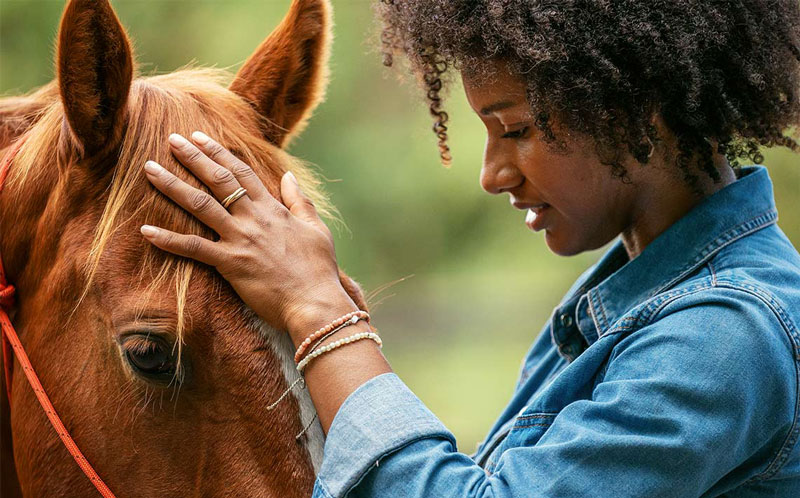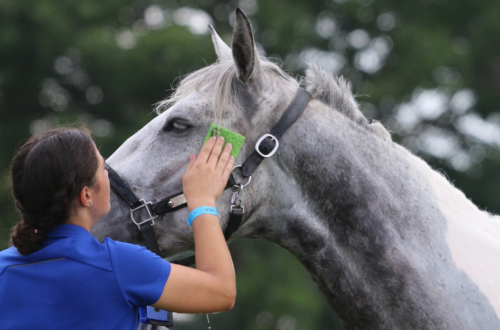
Flies are More Than a Nuisance: Tips for Preventing Summer Sores
By Kenton Morgan, DVM, Equine Technical Services Veterinarian, Zoetis
Flies are more than a nuisance—these insects can transmit diseases, cause bacterial infections, and trigger equine allergic dermatitis. They also leave behind parasitic larvae that can fester into painful, difficult-to-treat summer sores (cutaneous habronemiasis).
Developing an effective fly control plan to prevent these nonhealing wounds begins with understanding which fly species to target, how they reproduce, and how they can irritate your horse (or pony). Plus, there’s an added benefit—proactively reducing fly populations that cause summer sores can help prevent other diseases they carry, too.
Know Your Fly Populations
House flies and stable flies share similarities: They look alike and can be linked to the spread of strangles, equine influenza, Salmonella, summer sores, vesicular stomatitis, E. coli, pigeon fever, and equine dermatitis (Onchocerca). The females of both species lay eggs in decaying organic material, like rotting hay, bedding, and leaves.
These insects are distinguished by their mouthparts:
- House flies have sponge-like mouthparts and feed on the mucous and moisture around the eyes and mouth, wounds, and genitalia.
- Stable flies have biting mouthparts that pierce the skin like a needle so they can take a blood meal.
The Fly Life Cycle
Horses pick up equine stomach worm larvae from their feeding activities and then, once ingested, they mature into adults in the stomach of the horse. Once mature, the adult worms lay eggs. Those eggs are shed into the environment in your horse’s manure, where flies feed on the hatched larvae.1
What Causes Summer Sores?
Despite their differences, both species can deposit infective larvae of the equine stomach worm (Habronema muscae or Habronema microstoma) in open wounds or around moist areas while feeding on your horse. These stomach worm larvae, which are trapped in place and can’t get to the stomach, can then trigger severe itchiness, inflammation, and ulceration around the affected site. Proud flesh (granulomatous tissue, also called hypergranulation, overgranulation, and exuberant tissue) commonly develops, causing a chronic wound condition that’s difficult to heal.1
Some important points about summer sores:
- Summer sores can be complicated by secondary bacterial infections. These lesions may also contain small, rice-like, calcified structures that add to this chronic irritation.
- Treatment of summer sores is difficult and typically includes a combination of topical and systemic medications. In extreme cases, surgery is necessary to remove proud flesh that has formed. Some lesions will appear to resolve during the winter months, only to flare up again as the days begin to warm in the spring and summer. Summer sores rarely heal on their own and are challenging to treat.
- Call your veterinarian as soon as you notice minor lacerations that don’t heal quickly or if you see any abnormal lesions on your horse.
Take Preventive Steps Today
Getting a head start on fly season can help provide the most effective control to prevent immature flies from developing into adults. Flies begin to emerge once temperatures rise above 50ºF, so depending on where you live, that could be between February and April. In mild climates, house and stable flies breed year-round, with peak populations occurring during humid months. Here are some steps you can take in the fight against flies:
- About one month prior to the start of fly season in your area, it may be helpful to feed an insect growth regulator supplement that prevents the production of chitin. Chitin is a natural compound that house and stable flies need to develop their exoskeletons, and when larvae are exposed to a growth regulator supplement in the horse’s manure, they cannot develop into adult flies. Instead, they die off.
- This pelleted supplement can be administered after the start of fly season, but it takes a few weeks to “catch up” to the existing fly population. For maximum effectiveness, begin treatment prior to the onset of fly season and continue treating all horses on your property throughout fly season.
- The American Association of Equine Practitioners recommends making deworming decisions based on your horse’s age, egg shedding levels, and the length of the grazing season in your area. Deworming your horse at the beginning of the grazing season is also an important component in reducing stomach worm populations.
A Nod to Good Horsekeeping
Breaking the fly life cycle begins with good horsekeeping practices. In addition to using a feedthrough product and deworming your horse, be sure to:
- Remove wet organic material, such as old hay, bedding, and leaves.
- Change round bale locations frequently and discard damp leftovers.
- Dump manure as far from the barn as possible, and compost it if it cannot be removed from the property.
- Eliminate standing or pooling water.
- Use fly traps, sprays, and fly predators.
- Use fly masks, sheets, and boots to protect your horse, when practical.
- Protect open wounds, even minor ones, to keep flies off the area.
- Understand that having cattle on the property increases total fly populations.
Schedule a Call With Your Veterinarian
Involving your veterinarian sooner rather than later is essential to treating summer sores to use the least invasive protocols. What looks like a minor wound can trigger an inflammatory reaction that spirals out of control, becoming a nonhealing wound that lingers or worsens over time.
References
- Lenz T. Summer sores. American Association of Equine Practitioners. https://aaep.org/horsehealth/summer-sores; Accessed March 1, 2023.
- American Association of Equine Practitioners. Internal parasite control guidelines. https://aaep.org/document/internal-parasite-control-guidelines. Accessed March 1, 2023.

About Zoetis— Official USPC Equine Health and Wellness Partner
To learn more about how Zoetis is making lives better for horses and those who care for them, visit zoetisequine.com and Zoetis Equine on Facebook and Instagram.





